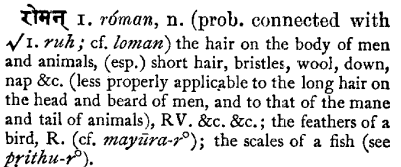Some months back
John Garth and I were discussing the phrase "Mani Aroman," which is found in
The Return of the Shadow as a possible name for the people Tolkien eventually called the Rohirrim (
Return 434). Tolkien indicates that "Mani Aroman" means the "Beardless Men." Tolkien being Tolkien, of course we have to wonder where these two words come from and how it is that they mean "Beardless Men."
Before we get to the speculation on these words, we should note a couple of points. First, Tolkien came up with this phrase long before he ever came near Rohan, and, as John Garth has
shown, it took some time before this particular group of horsemen became the pseudo-Anglo-Saxon/Gothic horsemen we know from
The Lord of the Rings. So it's no surprise if the beardless state of these riders clashes with Tolkien's later descriptions of the appearance of the Rohirrim, with our own notions of what the Germanic inhabitants of north-western Europe or early medieval England looked like, or with current notions that the beard makes the man.*
Second, elsewhere but still before the Rohirrim we know appear, Tolkien calls them "Anaxippians" and "Hippanaletians." The first of these clearly derives from Ancient Greek, and means "Horse-Lords" -- anax (ἄναξ) is a good Homeric word for king or lord, and (h)ippos (ἵππος), which we see in both words, means "horse." (Even a decade later he will refer to the Rohirrim as "heroic 'Homeric' horsemen" in Letter 131 (Letters p. 221). "Hippanaletians," aside from its first syllable, is not as easily analyzed, but my best guess so far is that it might mean "wanderers on horseback" -- coined from a combination of ἵππ(ος), ἀν(ά)/on, ἀλήτης/wanderer, hipp-an-aletes. A man who invents entire languages is not going to be shy about coining new words from old languages. "Eucatastrophe" is surely the prime example of this in Tolkien (Letters # 89 p. 142).
"Mani Aroman," however, defied our scrutiny. The words did not seem to be derived from Greek or any other likely language we could think of. Now John Garth had drawn attention to "Mani" and suggested that it might be connected to the names of various ancient Germanic tribes as handed down to us through Latin. For example, the Marcomanni, in which -manni is akin to the English "man," and -marco to "mark." This of course makes the Marcomanni the Men of the Mark, which for obvious reasons is attractive. The "Aroman" didn't fit with this, however.
But the "Mani" stuck with me, and eventually I asked myself whether it could be Sanskrit. So I tried some googling and discovered that the Sanskrit word for "man" is "manu:"
I then searched for "Aroman" as a Sanskrit word, and found:
And this is derived from:
From this it seems to me that Tolkien might derive Mani Aroman, the Beardless Men, who later become the Rohirrim, from the Sanskrit words for "man" and "hairless." It would take real determination to view "hairless" and "beardless" as merely coincidental. But I don't know Sanskrit, and I haven't yet been able to find someone who does to consult about this. So, while this suggestion makes sense to me, that doesn't make me correct.
_________________________________
* The present insistence in some quarters that the "manliness" of a man is predicated on his possession of a beard straight out of a Matthew Brady Civil War photograph makes me think that a parody of "The Rape of the Lock" is in order.
Oh hadst thou, cruel! been content to seize
Hairs less in sight, or any hairs but these!"

So was Aragorn beardless (Bakshi) or bearded (everybody else)?
ReplyDelete